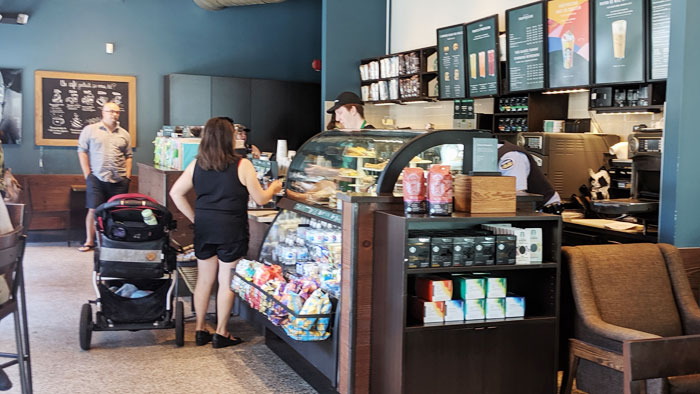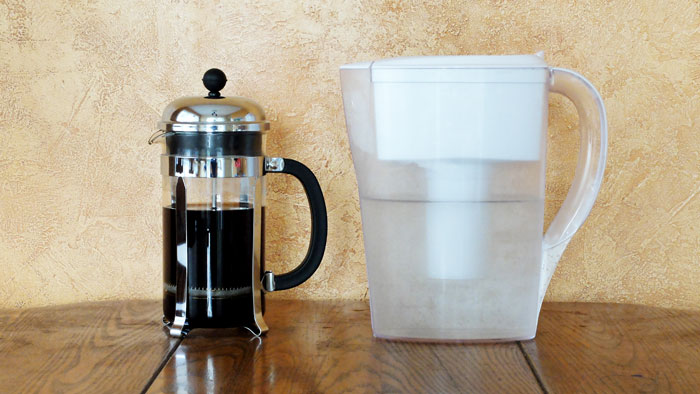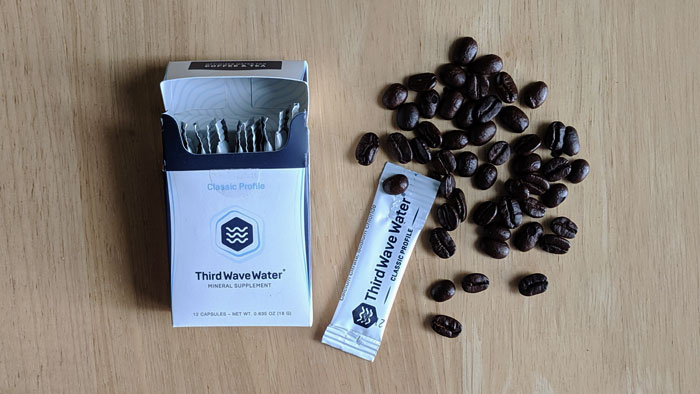What is the best water for making coffee?
When you’re making gourmet coffee at home, it’s only natural to focus on the coffee beans you’re buying.
After all, it’s the coffee beans that deliver the flavor.
And you’re going to grind them just before brewing. And make sure the water temperature is just right. And that the immersion time isn’t too short or too long.
That’s all good. It’s as it should be.
But what about the water you’re using?
Water makes up about 98% of the volume of your coffee and, it turns out, can have a significant impact on the taste.
Poor quality water can ruin the taste of even the best coffee beans.
If you want good coffee, you need to start with clean water.
This is step one.
The SCAA coffee brewing guidelines recommend that the water you use be clean, odor-free, clear and with no chlorine.
In other words, you need to start with clean water.
Your situation is going to depend on where you live and whether you’re on city water or well water.
But if your tap water doesn’t meet those SCAA guidelines, you need to filter your water before you use it to brew coffee.
A simple jug filter system, like those offered by Brita, will often do the trick. Or maybe you already have an inline water filtration system installed in your home.
Whether your water is hard or soft makes a big difference to the taste of your coffee.
Going back to those SCAA guidelines, your water should have a neutral pH of close to 7 – not too acidic or too alkaline.
But the big difference seems to be related to how soft or hard your water is.
At Coffee Detective we’ve been a bit slow to really appreciate this. Probably because our own tap water is really good, and falls within the optimum range for making good coffee.
Water hardness is a measure of the amount of magnesium and calcium that is dissolved in water.
Water rich in these two minerals (magnesium in particular) does a good job of bringing out the flavors in your coffee.
On the other hand, if your water is too soft, it does a poor job of extracting the flavor from even the best coffee.
There’s some chemistry there that’s beyond us. But we were surprised to discover what a big different the hardness of your water can make to the quality of the brew.
This explains why the same coffee tastes different in different places.
 If you buy some coffee you love from a chain coffee store, but it tastes different when you brew it at home... it may be because you have different water.
If you buy some coffee you love from a chain coffee store, but it tastes different when you brew it at home... it may be because you have different water.We get questions about this all the time.
People try a coffee while on vacation or visiting friends, and love it. So they buy some of the coffee beans being used and bring them home.
But when they grind the beans and make the coffee at home, the taste is quite different.
The reason? It’s probably the water.
Same with when you enjoy coffee at a store like Starbucks or Dunkin and make the coffee at home – only to find it doesn’t taste the same.
There can be a few reasons for that. But again, a big reason could be the water.
How to “make” water that’s perfect for brewing coffee.
If you want to explore this for yourself, there is a way to make the “perfect water” for making coffee.
First, you buy some distilled water.
Distilled water alone is terrible for making coffee, because it contains no minerals at all. You’ll get a very flat brew.
But you can buy pre-mixed sachets of chemicals to add to the distilled water. You can get these from companies like Third Wave Water.
Add the powder to the water and you have the perfect water for making coffee.
This could be a fun thing to try.
And if you live in an area where you have soft water, it could open your eyes to a whole new intensity of taste when brewing your own coffee.
Before you go, sign up to receive the Coffee Detective Newsletter...
Sign up for occasional newsletters about the best coffees and brewing equipment. Plus special updates from the Coffee Detective Coffee Store…






